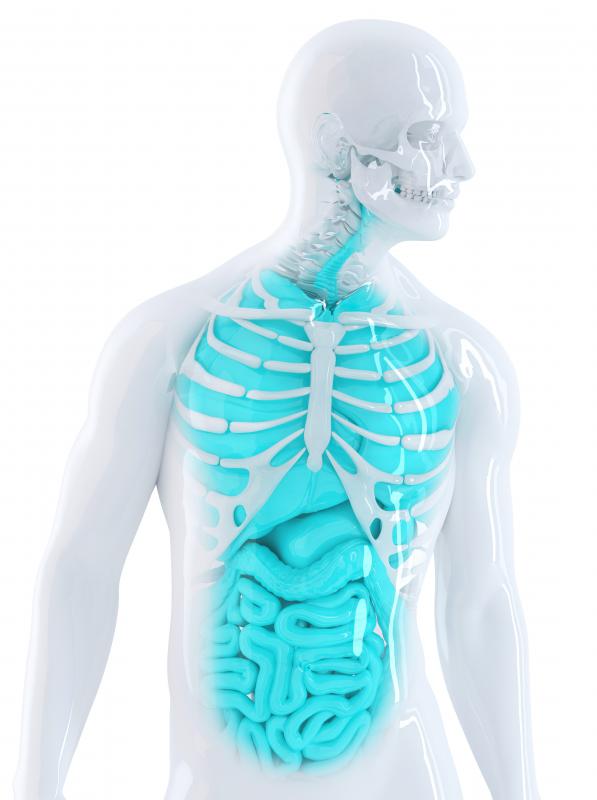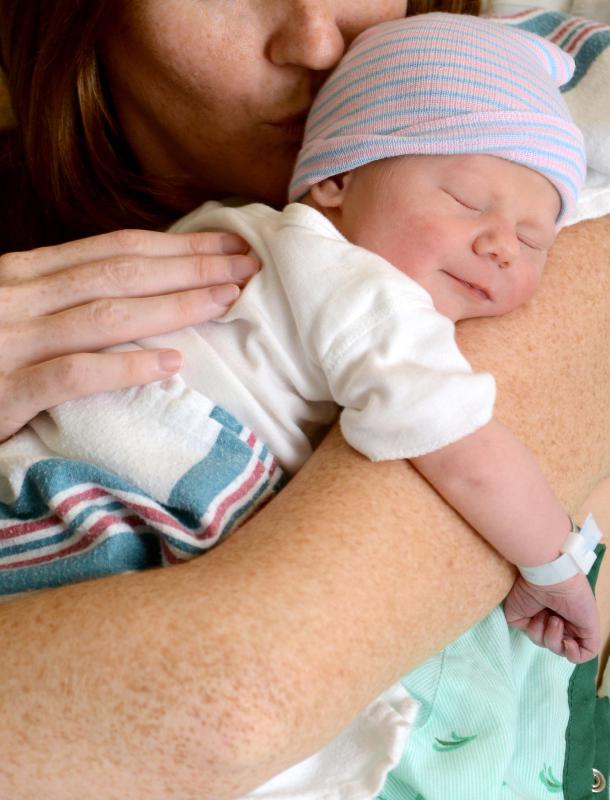At TheHealthBoard, we're committed to delivering accurate, trustworthy information. Our expert-authored content is rigorously fact-checked and sourced from credible authorities. Discover how we uphold the highest standards in providing you with reliable knowledge.
What is Pneumatosis Intestinalis?
Pneumatosis intestinalis is a condition in which gas is present in the mucous lining of the small or large intestine. The condition itself is not considered a disease, and many cases do not cause any symptoms or health problems. Pneumatosis intestinalis may, however, be indicative of a number of different gastrointestinal disorders or chronic obstructive pulmonary disease. Infants with the condition are likely to also experience necrotizing enterocolitis, or death of intestine tissue. Doctors usually try to identify and treat the underlying cause of the condition to prevent serious health issues.
A person who shows signs of the condition is likely to have an inflammatory gastrointestinal disorder or a pulmonary obstruction. Bacterial infections, Crohn's disease, and ulcerative colitis can all lead to inflammation, irritation, and gas buildup. In addition, blood flow to the bowels can be disrupted in a condition called ischemia. A lack of oxygenated blood causes hydrogen gas buildups in the intestinal walls and eventually results in necrosis of intestinal tissue. Patients with symptomatic pneumatosis intestinalis may experience diarrhea, chronic abdominal pain and swelling, constipation, and fatigue.

Treating the underlying cause, when one can be determined, is essential to prevent permanent and sometimes life-threatening complications. Many types of inflammatory bowel disease and pulmonary obstructions can be controlled with corticosteroids and antibiotics. Cases of bowel ischemia often necessitate surgical intervention to clear away damaged tissue and restore proper blood flow to the intestines. Regular checkups typically are important following treatment to ensure that gas buildup dissipates and the underlying cause is kept under control.

This disorder may not be discovered until a patient undergoes medical screening for a different problem. If a doctor notices gas buildup in the bowel walls, he or she can conduct further imaging scans, take blood samples, and remove a piece of intestinal tissue for laboratory testing. In cases where the condition is idiopathic and does not cause any adverse symptoms, patients do not normally need to receive treatment. Benign pneumatosis intestinalis tends to disappear over the course of weeks or months.

Most cases of intestinalis in infants are associated with necrosis of bowel tissue, in which the lining of the intestines dies and erodes. Necrotizing entercolitis is most common in premature newborns, and can causes bloody diarrhea, distension, and vomiting. The disease can be fatal if treatment is not immediate. An emergency surgeon may try to alleviate symptoms by removing dead tissue from the bowel and administering antibiotics. Gas and irritation typically are relieved when necrotizing entercolitis is effectively treated.
AS FEATURED ON:
AS FEATURED ON:














Discussion Comments
My baby, four days old, is now being treated for NEC. He is improving a lot with medical management with antibiotics and an IV. Do you know any future major impacts from this?
I was just told that my 1 1/2 month old baby boy may have Pneumatosis Intestinalis and I'm not sure how to take this information. It doesn't sound good in any way and looking into it, I see that it can be very devastating for him.
How will they go about fixing this? I've seen most the time you need surgery, so is this the only way to go? I'm just asking because I don't know and I am scared for him.
I think it's interesting that the underlying symptoms for this condition in adults aren't actually that worrying on first glance. You could easily experience diarrhea and fatigue if you were just sick with a bug. However, I guess the symptoms of pneumatosis intestinalis are chronic.
I'm sure if most people were experiencing those symptoms for an extended period of time, they would probably head to the doctor. On the other hand if you already had something like Crohn's disease those symptoms are probably just par for the course.
Anyway, this illness seems kind of tricky, but luckily there is treatment for it!
@Monika - Pneumatosis intestinalis in babies is really scary. One of my sister's friend's had a baby with pneumatosis intestinalis (x-ray diagnosed it). The baby is fine now, but she had to have surgery when the condition was first diagnosed.
As the article said, the baby started vomiting and having bloody diarrhea, so the parents rushed it to the emergency room. And it did end up being an emergency situation for sure! After all, babies can die from this condition if you don't catch it in time.
It's crazy how pneumatosis intestinalis can sometimes be life threatening and sometimes not be a problem. I bet some people with this condition never even know they had it, since the benign kind of pneumatosis intestinalis can just go away on it's own.
On the other hand, it can be life threatening in babies and cause tissue death, which sounds really scary. I wonder if infants might be a little bit more prone to this condition than adults? After all, their systems are all just forming and their immune systems aren't very strong yet.
Post your comments